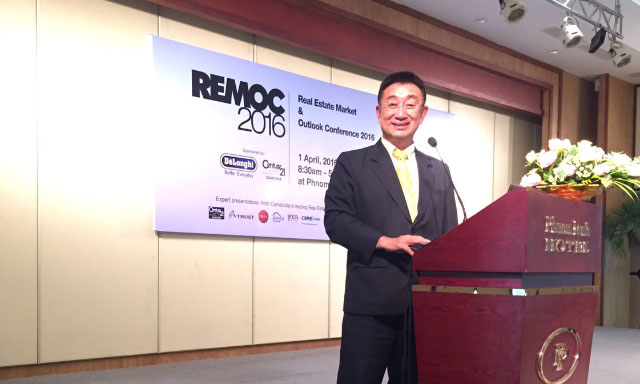 Realestate.com.kh caught up with Dr. Sopon Pornchokchai, Ph.D., D.FIABCI, CRS, MRICS, President of AREA, Bangkok, Thailand, last time he visited the Kingdom, to get his view on the Cambodian property sphere.
1) What is your real estate experience in Thailand, and in Cambodia? Tell us about your career so far.
I was involved in real estate since 1982 as a lecturer, planner, researcher and valuer - but I am not a broker nor a developer, so that I can stay academically and professionally neutral. I visited Cambodia in 2000 and have conducted surveys on housing estates in Phnom Penh since 2004. I have came back on many occasions to lecture for the Cambodian Ministry of Finance as well as the Cambodian Valuers and Estate Agents Association (CVEA) since 2010.
2) Why are you so interested in the Cambodian real estate sector? Why is this such an exciting market?
Cambodia is a great country where there was once a big empire with a lot of historical heritage and culture to learn. In terms of real estate, Cambodia is one of the most booming countries in the region at this moment.
3) What are the current issues in the Cambodian valuation industry?
Since I came to teach valuation in Cambodia, I have observed that this profession has been developed very quickly. This comes from the great efforts of the related government agency, namely, the Ministry of Finance, as well as the leaders of the industry, namely the presidents and board members of the CVEA who have helped establish the industry very strongly with the help of the many individual companies within it. However, good and reasonable transaction data must be disclosed in order to have reliable sources of information for valuation, transaction and taxation purposes.
4) How can these issues be resolved into the future? In your opinion.
The government must enforce the proper tax and land laws. Everyone must pay tax in accordance with their real transacted value. This tax must not be levied too highly though. It could be as low as 0.1 percent. However, in the case of annual property tax, the central government must allow local authorities to tax people themselves. Meanwhile, the budget which came from indirect taxes from the Central Government must be minimized. Then a good system of taxation and a sound property database can be established.
5) Why are valuation standards so important for a sustainable real estate market?
Actually, valuation standards are the same everywhere in the world. It is rooted in economic concepts and there are only very slight differences in different standards worldwide. With that in mind, don't let those more advanced countries fool us into assuming that we are substandard. The matter should be more focussed on the indemnity insurance and proper control of the practices of the professionals in our country.
6) How is the Thailand real estate market different to Cambodia?
Thailand and Cambodia were very similar some 60 years ago. Cambodia was even considered the “Paris of the East.” Due to civil wars, Cambodia stopped their development. However, today, Cambodia is learning from other neighbouring countries very quickly and will be developed at the same pace with others soon.
In real estate, landed shophouses are still popular in Phnom Penh (35% of the stock); whereas, condominiums are the majority of developments in Bangkok (60%). Also, Thailand has a lot more commercial properties due to the fact that people have higher purchasing power.
7) How is the Thailand real estate market the same as Cambodia?
The similarities between the two countries is the lifestyle and the housing preferences. We are on the same path of development, albeit Thailand sits a bit in advance. In Thailand, we are now in a rather 'dark' age where politics and economy are both slow and problematic. Whereas, Cambodia has a better political atmosphere for the future. Yet, Phnom Penh's real estate markets may reach a peak and cool down somewhat in the near future.
Realestate.com.kh caught up with Dr. Sopon Pornchokchai, Ph.D., D.FIABCI, CRS, MRICS, President of AREA, Bangkok, Thailand, last time he visited the Kingdom, to get his view on the Cambodian property sphere.
1) What is your real estate experience in Thailand, and in Cambodia? Tell us about your career so far.
I was involved in real estate since 1982 as a lecturer, planner, researcher and valuer - but I am not a broker nor a developer, so that I can stay academically and professionally neutral. I visited Cambodia in 2000 and have conducted surveys on housing estates in Phnom Penh since 2004. I have came back on many occasions to lecture for the Cambodian Ministry of Finance as well as the Cambodian Valuers and Estate Agents Association (CVEA) since 2010.
2) Why are you so interested in the Cambodian real estate sector? Why is this such an exciting market?
Cambodia is a great country where there was once a big empire with a lot of historical heritage and culture to learn. In terms of real estate, Cambodia is one of the most booming countries in the region at this moment.
3) What are the current issues in the Cambodian valuation industry?
Since I came to teach valuation in Cambodia, I have observed that this profession has been developed very quickly. This comes from the great efforts of the related government agency, namely, the Ministry of Finance, as well as the leaders of the industry, namely the presidents and board members of the CVEA who have helped establish the industry very strongly with the help of the many individual companies within it. However, good and reasonable transaction data must be disclosed in order to have reliable sources of information for valuation, transaction and taxation purposes.
4) How can these issues be resolved into the future? In your opinion.
The government must enforce the proper tax and land laws. Everyone must pay tax in accordance with their real transacted value. This tax must not be levied too highly though. It could be as low as 0.1 percent. However, in the case of annual property tax, the central government must allow local authorities to tax people themselves. Meanwhile, the budget which came from indirect taxes from the Central Government must be minimized. Then a good system of taxation and a sound property database can be established.
5) Why are valuation standards so important for a sustainable real estate market?
Actually, valuation standards are the same everywhere in the world. It is rooted in economic concepts and there are only very slight differences in different standards worldwide. With that in mind, don't let those more advanced countries fool us into assuming that we are substandard. The matter should be more focussed on the indemnity insurance and proper control of the practices of the professionals in our country.
6) How is the Thailand real estate market different to Cambodia?
Thailand and Cambodia were very similar some 60 years ago. Cambodia was even considered the “Paris of the East.” Due to civil wars, Cambodia stopped their development. However, today, Cambodia is learning from other neighbouring countries very quickly and will be developed at the same pace with others soon.
In real estate, landed shophouses are still popular in Phnom Penh (35% of the stock); whereas, condominiums are the majority of developments in Bangkok (60%). Also, Thailand has a lot more commercial properties due to the fact that people have higher purchasing power.
7) How is the Thailand real estate market the same as Cambodia?
The similarities between the two countries is the lifestyle and the housing preferences. We are on the same path of development, albeit Thailand sits a bit in advance. In Thailand, we are now in a rather 'dark' age where politics and economy are both slow and problematic. Whereas, Cambodia has a better political atmosphere for the future. Yet, Phnom Penh's real estate markets may reach a peak and cool down somewhat in the near future. 
Updated on: June 6, 2022, 5:06 p.m.
Published on: May 29, 2016, 3:15 a.m.
Dr. Sopon Pornchokcha: Exclusive Q & A on Cambodian Real Estate and Valuation
 Realestate.com.kh caught up with Dr. Sopon Pornchokchai, Ph.D., D.FIABCI, CRS, MRICS, President of AREA, Bangkok, Thailand, last time he visited the Kingdom, to get his view on the Cambodian property sphere.
1) What is your real estate experience in Thailand, and in Cambodia? Tell us about your career so far.
I was involved in real estate since 1982 as a lecturer, planner, researcher and valuer - but I am not a broker nor a developer, so that I can stay academically and professionally neutral. I visited Cambodia in 2000 and have conducted surveys on housing estates in Phnom Penh since 2004. I have came back on many occasions to lecture for the Cambodian Ministry of Finance as well as the Cambodian Valuers and Estate Agents Association (CVEA) since 2010.
2) Why are you so interested in the Cambodian real estate sector? Why is this such an exciting market?
Cambodia is a great country where there was once a big empire with a lot of historical heritage and culture to learn. In terms of real estate, Cambodia is one of the most booming countries in the region at this moment.
3) What are the current issues in the Cambodian valuation industry?
Since I came to teach valuation in Cambodia, I have observed that this profession has been developed very quickly. This comes from the great efforts of the related government agency, namely, the Ministry of Finance, as well as the leaders of the industry, namely the presidents and board members of the CVEA who have helped establish the industry very strongly with the help of the many individual companies within it. However, good and reasonable transaction data must be disclosed in order to have reliable sources of information for valuation, transaction and taxation purposes.
4) How can these issues be resolved into the future? In your opinion.
The government must enforce the proper tax and land laws. Everyone must pay tax in accordance with their real transacted value. This tax must not be levied too highly though. It could be as low as 0.1 percent. However, in the case of annual property tax, the central government must allow local authorities to tax people themselves. Meanwhile, the budget which came from indirect taxes from the Central Government must be minimized. Then a good system of taxation and a sound property database can be established.
5) Why are valuation standards so important for a sustainable real estate market?
Actually, valuation standards are the same everywhere in the world. It is rooted in economic concepts and there are only very slight differences in different standards worldwide. With that in mind, don't let those more advanced countries fool us into assuming that we are substandard. The matter should be more focussed on the indemnity insurance and proper control of the practices of the professionals in our country.
6) How is the Thailand real estate market different to Cambodia?
Thailand and Cambodia were very similar some 60 years ago. Cambodia was even considered the “Paris of the East.” Due to civil wars, Cambodia stopped their development. However, today, Cambodia is learning from other neighbouring countries very quickly and will be developed at the same pace with others soon.
In real estate, landed shophouses are still popular in Phnom Penh (35% of the stock); whereas, condominiums are the majority of developments in Bangkok (60%). Also, Thailand has a lot more commercial properties due to the fact that people have higher purchasing power.
7) How is the Thailand real estate market the same as Cambodia?
The similarities between the two countries is the lifestyle and the housing preferences. We are on the same path of development, albeit Thailand sits a bit in advance. In Thailand, we are now in a rather 'dark' age where politics and economy are both slow and problematic. Whereas, Cambodia has a better political atmosphere for the future. Yet, Phnom Penh's real estate markets may reach a peak and cool down somewhat in the near future.
Realestate.com.kh caught up with Dr. Sopon Pornchokchai, Ph.D., D.FIABCI, CRS, MRICS, President of AREA, Bangkok, Thailand, last time he visited the Kingdom, to get his view on the Cambodian property sphere.
1) What is your real estate experience in Thailand, and in Cambodia? Tell us about your career so far.
I was involved in real estate since 1982 as a lecturer, planner, researcher and valuer - but I am not a broker nor a developer, so that I can stay academically and professionally neutral. I visited Cambodia in 2000 and have conducted surveys on housing estates in Phnom Penh since 2004. I have came back on many occasions to lecture for the Cambodian Ministry of Finance as well as the Cambodian Valuers and Estate Agents Association (CVEA) since 2010.
2) Why are you so interested in the Cambodian real estate sector? Why is this such an exciting market?
Cambodia is a great country where there was once a big empire with a lot of historical heritage and culture to learn. In terms of real estate, Cambodia is one of the most booming countries in the region at this moment.
3) What are the current issues in the Cambodian valuation industry?
Since I came to teach valuation in Cambodia, I have observed that this profession has been developed very quickly. This comes from the great efforts of the related government agency, namely, the Ministry of Finance, as well as the leaders of the industry, namely the presidents and board members of the CVEA who have helped establish the industry very strongly with the help of the many individual companies within it. However, good and reasonable transaction data must be disclosed in order to have reliable sources of information for valuation, transaction and taxation purposes.
4) How can these issues be resolved into the future? In your opinion.
The government must enforce the proper tax and land laws. Everyone must pay tax in accordance with their real transacted value. This tax must not be levied too highly though. It could be as low as 0.1 percent. However, in the case of annual property tax, the central government must allow local authorities to tax people themselves. Meanwhile, the budget which came from indirect taxes from the Central Government must be minimized. Then a good system of taxation and a sound property database can be established.
5) Why are valuation standards so important for a sustainable real estate market?
Actually, valuation standards are the same everywhere in the world. It is rooted in economic concepts and there are only very slight differences in different standards worldwide. With that in mind, don't let those more advanced countries fool us into assuming that we are substandard. The matter should be more focussed on the indemnity insurance and proper control of the practices of the professionals in our country.
6) How is the Thailand real estate market different to Cambodia?
Thailand and Cambodia were very similar some 60 years ago. Cambodia was even considered the “Paris of the East.” Due to civil wars, Cambodia stopped their development. However, today, Cambodia is learning from other neighbouring countries very quickly and will be developed at the same pace with others soon.
In real estate, landed shophouses are still popular in Phnom Penh (35% of the stock); whereas, condominiums are the majority of developments in Bangkok (60%). Also, Thailand has a lot more commercial properties due to the fact that people have higher purchasing power.
7) How is the Thailand real estate market the same as Cambodia?
The similarities between the two countries is the lifestyle and the housing preferences. We are on the same path of development, albeit Thailand sits a bit in advance. In Thailand, we are now in a rather 'dark' age where politics and economy are both slow and problematic. Whereas, Cambodia has a better political atmosphere for the future. Yet, Phnom Penh's real estate markets may reach a peak and cool down somewhat in the near future. 


Comments